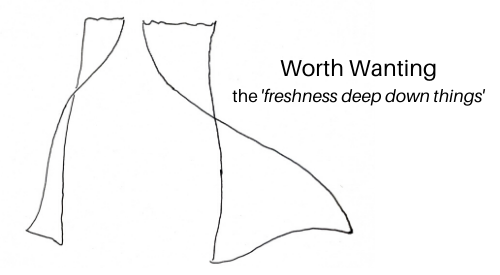
Maybe in human history there have been episodes of relative political peace, but what we know from our own experience is that ‘peace’–the absence of war and its ravages–doesn’t mean an absence of passionate struggle between contending factions with conflicting philosophies.
So it is today. Those who explicitly espouse, or implicitly agree with, the principles of encountering are obliged to actively protect them on every level–personal, political and planetary–from relentless disdain, mockery, strategic resistance and aggressive maneuvers.
But incessant conflict wears on us. We as warriors may be exultant in victory or be dismayed in defeat, but continual precaution and perpetual crisis can leave us feeling inwardly starved. What is it we’re defending? What lives in us–unarmored, relaxed and blithe–that we suit up to defend every day?
Of course, we do not stand alone as champions of encountering. Transcendent freshness is ever active everywhere, inviting all of us, on every side of every question, to encounters, that is to occasions of making common cause with the livingness of others, addressed as ‘you.’ And every encounter represents the creation of new and good potentialities that can contribute to the resolution of hitherto intractable issues. It’s in our encounters that we find the inner food we need not just to carry on, but to care about carrying on.
Freshness bestows gifts of livingness on us as we encounter–new horizons, new interests, new challenges, new relationships–which show ways forward. But other gifts of livingness provide the very sustenance we need to keep our spirits sweet and tender and ample, not hard and bitter and narrow. I’m speaking of wonder, admiration and gratitude.
This suit of attitudes represents a way of looking at the world, the mundane world–material and moral–that not only keeps us ready to encounter, but is nourishment for us as we encounter.
That the world is/ what it is/ for or to us is the basis of this perspective.
That the world is: primal awe at the multifarious profligacy of reality in its budding, blooming profusion, with its incessant arrivals and departures. It exists. Wow!
That the world is what it is: admiration of the particularity and precision of everything doing what it does in the great web of the world.
That the world is what it is for or to us is provokes gratitude. It needn’t provide for us, and yet it can and does, gratuitously–friendships, homecomings, discoveries, for instance.
This is not to deny the tragedies, failures and deprivations that are also characteristic of our existence, and particularly vivid for the warrior, but to honor other kinds of experience which are also the case.
How does one prepare for wonder, or admiration, or gratitude when life exigencies teach us to armor our souls?
I think the awe at creation finds its roots, and its resonance, in our sense of our own unplumbed potentiality. We feel that there’s so much more in us than we can or have manifested, and this applies to others and to the world as a whole.
Admiration is linked to the aspirations that drive us to want, to do, to master, to realize our potential. So we see any potential realized in anything, we understand the achievement in a visceral way.
Gratitude is grounded in the awareness of our own vul vulnerability, our fragility. We are dependent on others and the world every day for our continued existence. So the provision of the world is received with gratitude.
Freshness speaks to us in the language of wonder, admiration and gratitude, so that as we engage in the toil and moil of existence in the mundane world with its agonizing choices and uncomfortable compromises, we can be generously refreshed, reassured that the substance of what we work for is in fact worth wanting.
